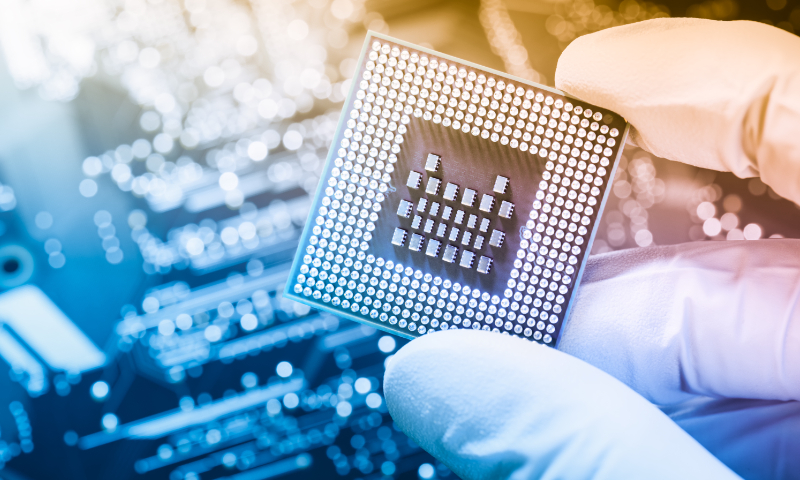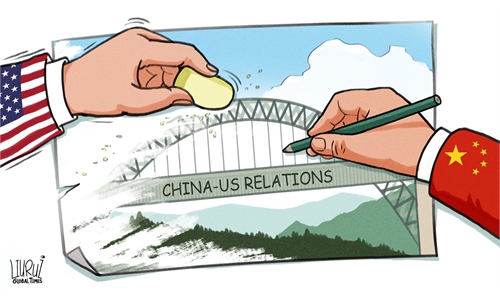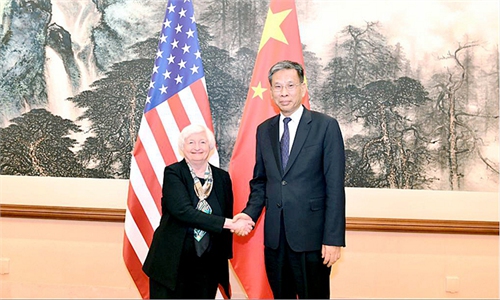Efforts by US to contain China’s semiconductor sector cause more self-harm: analysts

chip Illustration: VCG
US semiconductor giants has stepped up "last-ditch" efforts to lobby the White House against planned new curbs to restrict China's access to high-end artificial intelligence (AI) chips, US media reported.
The facts have proved that the US government isn't getting what it aspired to in its moves to assault China's technology rise, but the curbs end up with hurting America's own companies, analysts said.
The CEOs of Intel, Qualcomm and Nvidia plan to lobby against extending restrictions on the sale of certain chips to China, along with the equipment to manufacture them, as the Biden administration is said to roll out new curbs in the coming weeks, Bloomberg reported on Friday, citing people familiar with the matter.
The US is considering additional curbs on China's access to high-end chips used to power AI. The curbs would apply to sales of advanced chips made by companies such as Nvidia, AMD and Intel, a New York Times report said in June.
Li Zheng, an associate research fellow at the Institute of American Studies under China Institutes of Contemporary International Relations, told the Global Times that the possible US restrictions could be deemed as "closing loopholes in its previous export controls."
In October, the Biden administration imposed sweeping chips export control measures to cut China off from certain semiconductors made with US technology.
As the diplomatic tensions between the two countries eased following recent high-level communications, experts said that the Biden administration may have second thoughts about escalating export controls.
Ma Jihua, a Beijing-based tech sector analyst, told the Global Times on Sunday that the White House is adjusting its policies as it realized that some of them, based on political considerations and not market logic, have caused more harm to US businesses and the supply chain.
"The lobbying of US chip giants might pave the way for some adjustment," Ma said.
He said that the Biden administration isn't likely to destroy ongoing bilateral efforts to stabilize ties, rocked by the "balloon crisis" earlier this year.
China's Ministry of Commerce said on Thursday that it holds an open and welcoming attitude toward a potential visit by US Secretary of Commerce Gina Raimondo.
Raimondo's visit would add to growing official bilateral exchanges on trade and economic fields. US Treasury Secretary Janet Yellen paid a four-day visit to China earlier this month, during which the two sides held what they called candid and constructive talks.
The lobbying itself shows that many US firms can't afford to quit from China, the world's top semiconductor market, Ma said.
Last year, China's imports of semiconductors fell 15 percent to 538.4 billion units, according to the General Administration of Customs.
US chip firms are seeking to avoid further losses in the world's second-largest economy, where they earn at least one-fifth of their annual revenues.
Jensen Huang, CEO of Nvidia, warned that the US tech industry is at risk of suffering enormous damage from the escalating tech battle.
In an interview with the Financial Times in May, Huang said US export controls to slow Chinese semiconductor manufacturing had left the Silicon Valley firm with its "hands tied behind our back" in the important market for the technology industry.
On July 11, Intel launched the Habana Gaudi 2, a deep learning accelerator card designed for the Chinese market that is aimed at enhancing AI training and inference capabilities. The move means Intel is trying its best to woo the market despite US restrictions, analysts said, adding that more US firms could follow suit.
In 2022, Intel's revenues in the Chinese market account for 27 percent of the total.
China's semiconductor development has maintained strong growth momentum with a whole-of-nation effort amid the reckless US attack.
"We have made some breakthroughs in key nodes of chip manufacturing, and things are moving along," Ma said.


